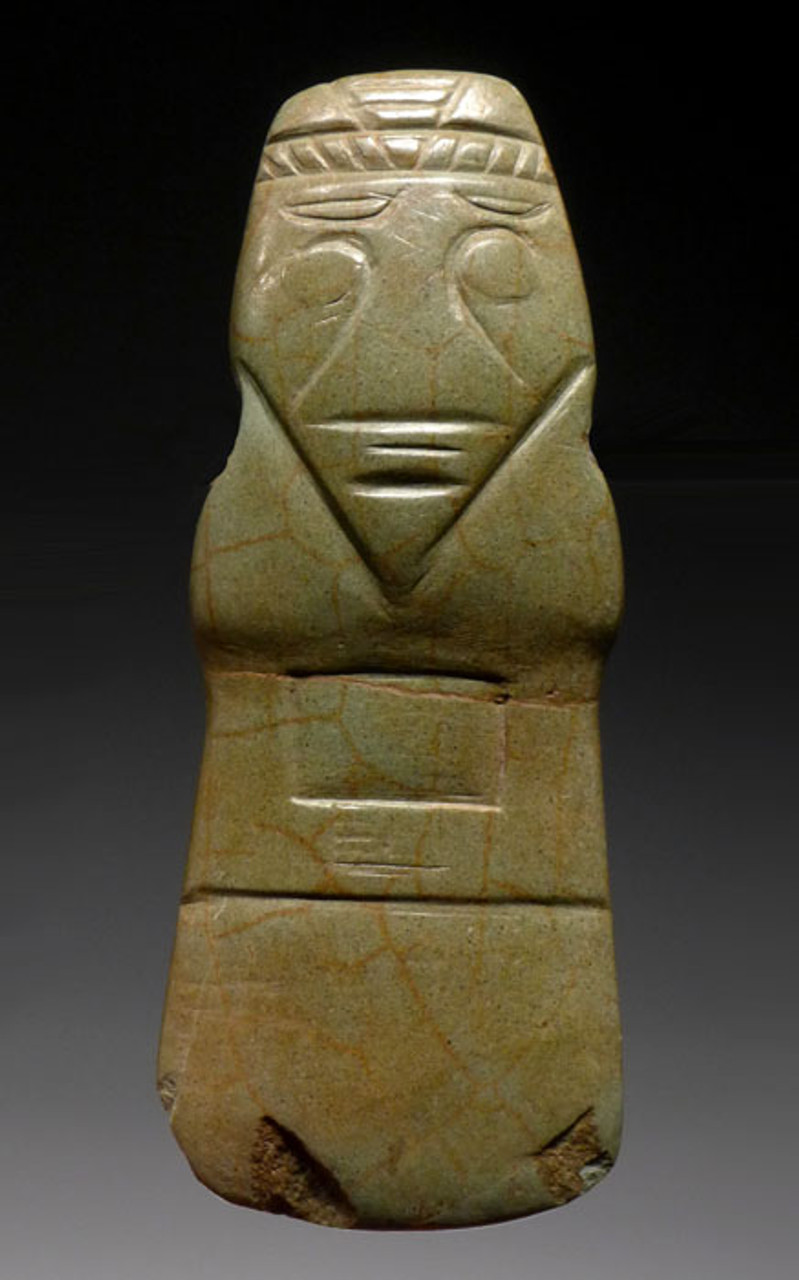Product Description
ITEM #
|
PC125
|
||
ID
|
Axe God Pendant
|
||
FOUND
|
Atlantic Watershed, Central America
|
||
AGE
|
Period IV: 300 B.C. - 500 A. D.
|
||
SIZE
|
3.5" long
|
||
CONDITION
|
COMPLETE, NO REPAIR OR RESTORATION.
|
||
NOTE
|
ROBUST FORM WITH EXCELLENT DARK
|
||
INCLUDES DISPLAY BOX - Actual Item - One Only
Comes with a certificate of authenticity / information sheet |
|||
Carved out of rich, olive-brown hardstone, this is an authentic "axe god" pendant of the Greater Nicoya Pre-Columbian Culture. Where clay objects could be made with relative lack of special skill and produced in high volumes, ground and polished stone objects required much more expertise and time to produce. Just the process of drilling across the piece was incredibly time-consuming!!! Pendants like this were probably worn to represent a connection to a patron god or for luck, much in the same way religious medals are still worn today. This remarkable example is larger than most and made on a robust form. It boasts of NO modern damage which is hard to find in authentic pieces. Surface is heavily mineralized and darkened by age patina with drilled side holes still impacted with original mineral sediment - a trait ONLY seen in AUTHENTIC specimens. 100% ORIGINAL, INTACT AND WITHOUT ANY REPAIR OR RESTORATION.
In some Mesoamerican Pre-Columbian Cultures, axe-like anthropomorphic pendants called "Axe Gods", can be found, often resembling a sharpened celt axe at the base and having features of some type of deity or figure.
This piece is attributed to the Greater Nicoya Pre-Columbian Culture. This archaeological culture prevailed in the area of Latin America comprising the far southwestern coastal region of Honduras, the far northwestern Pacific coastal region of Costa Rica and the Pacific side of coastal Nicaragua. This Indian culture thrived for many centuries before the first Spanish explorers made contact around 1500 A.D.. The people had no written language but spoke Nahuatl and had continual contact with the Aztec (Mexica) Indians of Central Mexico. The Gran Nicoya culture included many beautiful designs incorporating a variety of different mammals, reptiles and amphibians in effigy pieces. Their pottery is also known for complex glyph-like painted decorations. In the first 500 to 600 years A.D., resources became low as populations grew and warfare become increasingly evident. Tribes in this region practiced head-hunting and victim sacrifice in their warfare.
WARNING: There is an ALARMING number of fake ancient artifacts on the market. As fine quality intact, original specimens become more scarce and techniques have become more sophisticated to fake these artifacts. We have personally handled numerous extremely well-done fakes with extremely convincing patinas. The degree to which the fakers have been able to replicate patina to disguise their work requires an expert examination by highly experienced individuals. Like all rare collectibles, fakes plague the market. Deal only with sources that are extremely knowledgeable in forgeries or altered pieces and get a written guarantee of authenticity that has no conditions or expiration period. Paleo Direct includes this guarantee in writing with every item we sell. All purchases should include from the dealer a written guarantee of authenticity with unconditional and lifetime return policies regarding such guarantee.
 US DOLLAR
US DOLLAR
 EURO
EURO
 AUSTRALIAN DOLLAR
AUSTRALIAN DOLLAR
 CANADIAN DOLLAR
CANADIAN DOLLAR
 POUND STERLING
POUND STERLING












